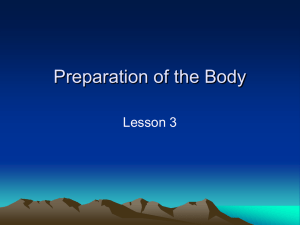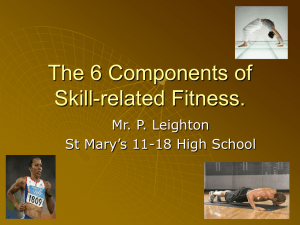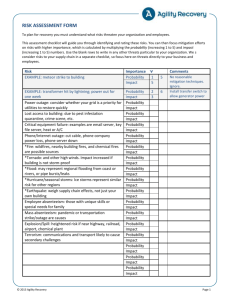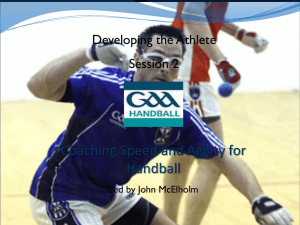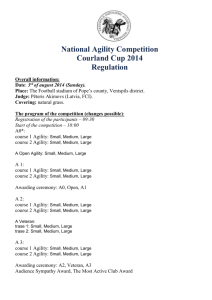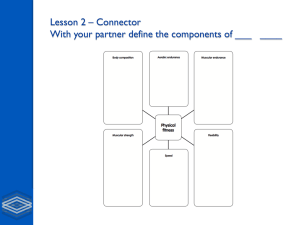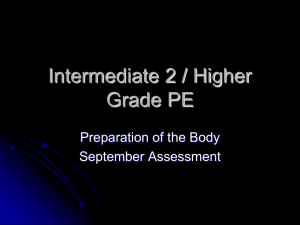Preparation of the Body
advertisement
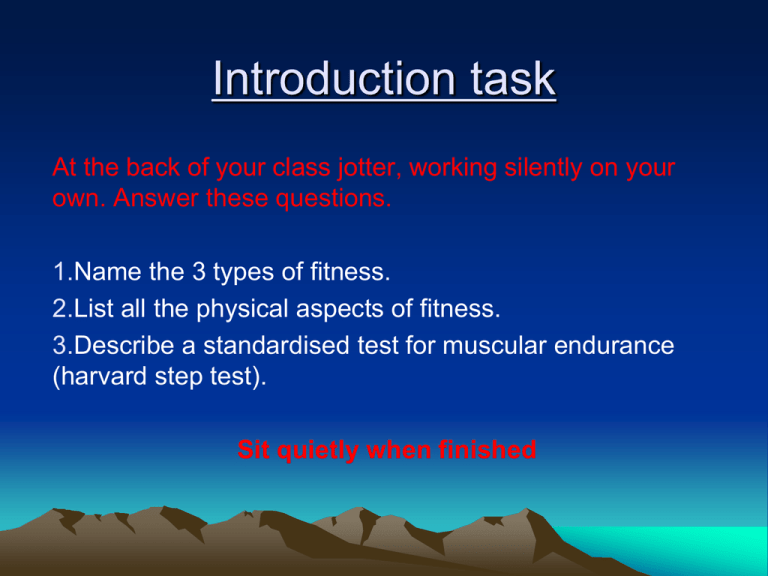
Introduction task At the back of your class jotter, working silently on your own. Answer these questions. 1.Name the 3 types of fitness. 2.List all the physical aspects of fitness. 3.Describe a standardised test for muscular endurance (harvard step test). Sit quietly when finished Preparation of the Body Lesson 3 Lesson Objectives • What are the aspects of skill related fitness? – Which one of these is most important to badminton and why? – How do you test skill related fitness? – Court based? – Standardised Test? The story so far… • We gathered general data on our whole performance in badminton by completing a scattergram during a 12 minute game (you have the procedure for this in your jotter). • This showed that as the game went on you were less likely to return shots from the corners of the court. • What could cause this? – Below average Local Muscular Endurance? – Below average Agility? • We have also gathered focused data on our LME using a standardised test called the Harvard Step Test. Skill-related Fitness • Aspects of skill-related fitness: • 1. Reaction time • 2. Agility • 3. Coordination • 4. Balance Aspects of skill-related fitness: Definitions Reaction time - the time taken between the recognition of a signal and the start of a movement. Agility - the ability to move the body quickly and precisely. Coordination - the ability to control movements smoothly and fluently. Balance - the ability to retain the centre of gravity over your base of support. Agility • Why is agility important for badminton? • Being an agile badminton player will allow you to reach, lunge, change direction easily and react quickly to get to the place on the court where you need to be to return the shuttle effectively. Gathering data on Agility. • We have gathered focused data on our agility using a standardised test called the Illinois Agility Test. • We have also performed an activity specific test called the Timed Fan Drill. ILLINOIS AGILITY TEST Standardised Testing Agility • The standardised test for Agility is the ILLINOIS AGILITY TEST. • The test procedure is as follows: 1. Mark out an area 10 metres in length and 5 m in width using 4 cones. 2. 4 cones are placed long ways down the centre of the area. These cones are 3.3m apart. 3. You lie face down on the floor at the start point. 4. On the assistant’s command you jump to your feet and move round the cones to the finish. 5. The assistant records the total time taken from their command to you completing the course. 6. You had 3 attempts and recorded your best score. Activity Specific Testing Agility • • The activity specific test for agility is the TIMED FAN DRILL. The test is completed as follows: 1. The participants starts in the centre of the court. 2. They take a shuttle from the centre out to each of the 4 corners - returning to the centre each time a shuttle is placed on the ground. 3. The participant then repeats the process but returns the shuttles to the centre. 4. The time is stopped when the last shuttle is returned to the centre. 5. The test is carried out 3 times with the best time being recorded. Homework 3 • Why is agility important for successful performance in badminton? • Describe how we gathered data on AGILITY. Describe an activity specific test and a standardised test. Do not just name the tests, explain how you did them!!
